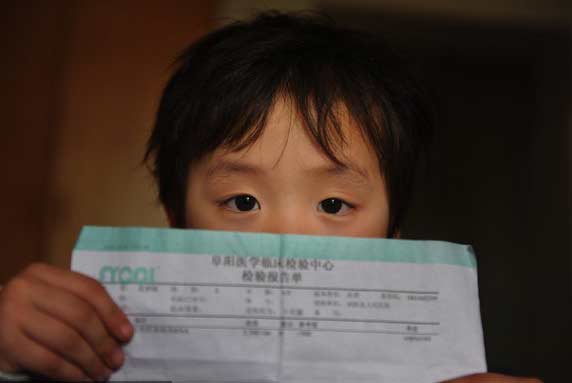Recycled needles spread hepatitis C
Updated: 2011-11-30 08:11
By Liu Nanxue and Li Yao (China Daily)
|
|||||||||||
 |
|
A girl displays a medical report claiming she has been diagnosed with hepatitis C virus in a hospital in Anhui province, Nov 28, 2011. [Photo/CFP]
|
The disease spread after a private clinic in the neighboring Henan province allegedly reused dirty needles, according to initial investigations led by Anhui's health bureau.
Six children, aged between two and six, are being treated at No 1 Hospital Affiliated to Anhui Medical University in the provincial capital Hefei. Seven others, whose ages are not known yet, have been sent to hospitals in Beijing, Shanghai and Nanjing, capital of Jiangsu province.
Most of the confirmed victims used to receive medical services at Miaoqian clinic, a family-run business in Maqiao township in Henan province, about eight kilometers from the border of Anhui and Henan.
Some parents claimed to have seen the same needle used to inject different children.
Chen Yuping, whose 2-year-old son, Zhang Ziheng, was confirmed carrying the virus, said residents of Laotian village in Guoyang, where she lived, brought their children to Miaoqian clinic as it cost less and treatment was quick.
Chen said Wu Wenyi was the doctor and owner of the clinic. Wu's daughter-in-law helps with making injections. Chen took her son for a blood test after she heard rumors of people contracting the virus in Henan.
"I insisted that they change needles for the sake of the children's health, but they didn't listen," Chen said.
Zhang Yongli, a migrant worker in Anhui's Chuzhou city, rushed back home when he heard his 5-year-old daughter, Zhang Zimeng, was infected with the virus.
"What if she gets discriminated against in the future because of the infection?" Zhang said.
Wei Lai, director of the hepatosis department at Peking University, said hepatitis C was curable and it was in fact possible to have the virus removed from one's body.
Unsafe injections, mostly involving the reuse of dirty needles, have caused HIV/AIDS, hepatitis B and C infections, Wei said.
A man from the Maqiao township-level supervising body of the clinic said Wu's clinic would remain open until Henan provincial authorities reached a final conclusion. Six residents in Maqiao have been confirmed to have contracted hepatitis C as of Monday.
In November 2009, 19 renal patients on dialysis treatment were found to have contracted hepatitis C due to the use of poor equipment and improper medical procedures in Huoshan county in Anhui. People responsible for the incident, including the head of the hospital, were sacked in December that year.
Hot Topics
HIV/AIDS, Egypt protest, Thanksgiving, climate change, global economic recovery, home prices, high-speed railways, school bus safety, Libya situation, Weekly photos
Editor's Picks

|

|

|

|

|

|







